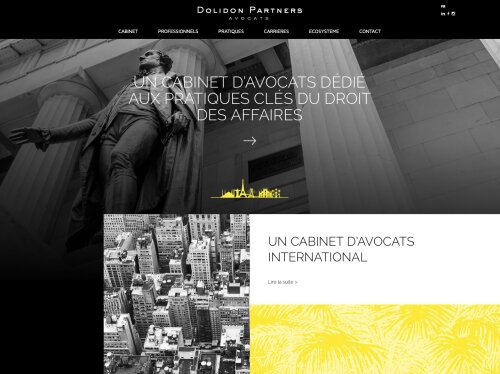Best Public-Private Partnerships (PPP) Lawyers in Paris
Share your needs with us, get contacted by law firms.
Free. Takes 2 min.
List of the best lawyers in Paris, France
About Public-Private Partnerships (PPP) Law in Paris, France
Public-Private Partnerships (PPP) are collaborative agreements between governmental entities and private sector companies to finance, build, and operate projects that serve the public interest. These arrangements are especially prevalent in infrastructure sectors such as transportation, healthcare, energy, and public facilities. In Paris, as in the rest of France, PPPs are regulated under a robust legal framework, primarily governed by national law, but also shaped by local regulations and the unique requirements of each municipality, including Paris. The PPP model enables public projects to benefit from private expertise, efficiency, and financing while ensuring that public needs are met and risks are shared appropriately between the parties.
Why You May Need a Lawyer
Entering into a Public-Private Partnership arrangement can be highly complex, involving intricate negotiations, contract drafting, regulatory compliance, and risk assessment. Legal assistance is often necessary in the following situations:
- You are a private company interested in bidding for a public infrastructure project in Paris.
- You work for a public authority considering a PPP structure for project delivery.
- You are involved in negotiating or managing a PPP contract and need to understand your rights and obligations.
- You are facing disputes or challenges in the execution of a PPP project.
- You need to ensure compliance with applicable procurement, environmental, and urban planning laws.
- You seek advice regarding risk allocation, financing terms, or contractual relationships.
- You require representation in legal proceedings or administrative reviews related to PPP matters.
Lawyers specializing in PPPs can guide you through the local legal landscape, assist in negotiating favorable terms, help avoid pitfalls, and protect your interests throughout the lifespan of the partnership.
Local Laws Overview
In Paris, Public-Private Partnerships are primarily regulated by the French Code of Public Procurement (Code de la commande publique), which was consolidated in 2019 and governs the award, execution, and management of public contracts, including PPPs. The main types of PPP agreements include the concessions (contrats de concession), délégation de service public (DSP), and public contracts such as works, supplies, and service contracts.
Key legal aspects to be aware of include:
- Transparent Procurement Processes: Competitive tendering procedures are mandated to ensure fairness.
- Contractual Structure: PPP agreements must clearly define rights, responsibilities, risk-sharing, and mechanisms for dispute resolution.
- Regulatory Approval: Certain PPP projects require authorization and oversight by regional or national entities.
- Urban and Environmental Compliance: Projects in Paris must comply with strict urban planning and environmental laws, often necessitating additional studies and permits.
- Monitoring and Performance: Public authorities are required to monitor the performance and financial stability of the private partner throughout the contract’s duration.
- European Union Influence: As France is part of the European Union, relevant EU directives on procurement and competition also apply.
Understanding and navigating these requirements is essential for all parties involved in PPPs in Paris.
Frequently Asked Questions
What is a Public-Private Partnership (PPP) in France?
A PPP is a long-term agreement between a public authority and a private operator for the design, construction, financing, operation, or maintenance of public infrastructure or services.
Are there different types of PPP contracts in Paris?
Yes, the most common types include concessions, public service delegation contracts, and partnership contracts, each with its own legal requirements and obligations.
How are PPP projects awarded in Paris?
Projects are typically awarded through transparent and competitive procurement procedures as required by the Code of Public Procurement, to ensure fairness and best value for public money.
Who monitors PPP contracts in Paris?
Both the contracting authority (such as the City of Paris) and regional oversight bodies are responsible for monitoring contract execution, ensuring compliance with agreed terms and public interests.
What are the main risks involved in PPP projects?
Risks can include financial, operational, legal, environmental, and political risks. Effective risk allocation in the contract is crucial.
How is risk shared in PPP agreements?
Risk is typically allocated to the party best able to manage it, resulting in a balance between public and private sector responsibilities set out in the contract.
Are environmental regulations strict for PPP projects in Paris?
Yes, Paris imposes stringent urban planning and environmental compliance requirements, often requiring environmental impact assessments and ongoing monitoring.
Can foreign companies participate in PPP projects in Paris?
Yes, PPP tenders are generally open to European and, depending on the sector, international companies, subject to compliance with French and EU laws.
What happens if there is a dispute in a PPP project?
Disputes may be resolved through contractual dispute resolution mechanisms, such as negotiation, mediation, or arbitration, or by taking the matter to administrative courts if necessary.
Is public consultation required for PPP projects in Paris?
For many large-scale projects, public consultation and transparency measures are mandatory, ensuring community involvement and adherence to local priorities.
Additional Resources
If you need further guidance or official information about PPPs in Paris, you may find the following resources helpful:
- City of Paris (Mairie de Paris): The city’s official website provides information on ongoing and upcoming public projects.
- Ministry for the Economy, Finance and Industrial and Digital Sovereignty - Public Procurement Department (DAJ): The DAJ offers detailed guidance on the Code of Public Procurement and related procedures.
- French National Institute for Public Procurement (INSP): Provides training and resources specifically for public procurement and PPPs.
- Council of State (Conseil d’Etat): Handles high-level administrative matters including PPP disputes.
- European PPP Expertise Centre (EPEC): Publishes studies and best practice guides on PPPs applicable in France and the EU.
- Paris Chamber of Commerce and Industry (CCI Paris Ile-de-France): Offers guidance and support for businesses seeking to engage in PPP projects.
Next Steps
If you need legal assistance regarding a Public-Private Partnership project in Paris, it is advisable to consult a lawyer specializing in public law and PPPs. Here are some steps you can take:
- Gather and organize all relevant documents, including project proposals, contracts, and correspondence.
- Prepare a clear summary of your goals, challenges, or questions regarding the PPP project.
- Seek recommendations or research local law firms with expertise in public procurement and PPP matters.
- Schedule an initial consultation to discuss your situation and potential legal strategies.
- Collaborate closely with your legal advisor to navigate regulatory requirements, negotiations, and any dispute resolution processes.
Engaging skilled legal counsel early in the process can help ensure your rights are protected and your PPP project proceeds smoothly within the legal framework of Paris, France.
Lawzana helps you find the best lawyers and law firms in Paris through a curated and pre-screened list of qualified legal professionals. Our platform offers rankings and detailed profiles of attorneys and law firms, allowing you to compare based on practice areas, including Public-Private Partnerships (PPP), experience, and client feedback.
Each profile includes a description of the firm's areas of practice, client reviews, team members and partners, year of establishment, spoken languages, office locations, contact information, social media presence, and any published articles or resources. Most firms on our platform speak English and are experienced in both local and international legal matters.
Get a quote from top-rated law firms in Paris, France — quickly, securely, and without unnecessary hassle.
Disclaimer:
The information provided on this page is for general informational purposes only and does not constitute legal advice. While we strive to ensure the accuracy and relevance of the content, legal information may change over time, and interpretations of the law can vary. You should always consult with a qualified legal professional for advice specific to your situation.
We disclaim all liability for actions taken or not taken based on the content of this page. If you believe any information is incorrect or outdated, please contact us, and we will review and update it where appropriate.
















